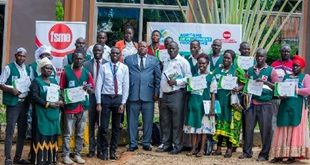
Kenya charges 16% VAT while the rest impose 18% on products produced within their countries
| THE INDEPENDENT | Uganda’s finance ministry and Uganda Revenue Authority executives have agreed that there is need to centralize collection of revenues within the East African Community.
This, they say, will play an important role on mitigating tax competition which has significant implications on attracting investors.
Article 32 of the EAC Common Market Protocol provides for the harmonization of tax policies to remove distortions and facilitate the movement of persons, goods and capital, to promote trade and investment, while Article 8 of the EAC Monetary Union Protocol provides for harmonization of fiscal policies for the avoidance of harmful competition. However, most of these policies are yet to be implemented.
Leonard Kizito Ojara, the Commissioner of Economic Affairs at the Ministry of EAC Affairs revealed during the Post-EAC Budget Dialogue on June.22 that Uganda as a member of the trading bloc is ready to implement policies geared towards the harmonization of the policies because the government knows its implications.
A study of the tax systems in the EAC by the Southern and Eastern Africa Trade Information and Negotiations Institute, SEATINI, found that the main impediment to implementing this, is the failure to apply the EAC Code of Ethics and fear of losing national revenues among others.
SEATINI Uganda Executive Director, Jane Nalunga said the EAC also has no guiding principles for implementing certain policies.
She said numerous taxes including excise duties on goods produced within the region, as well as the varying rates of Value Addition Tax and recently, Capital Gains Tax, have over the years caused controversies in the region.
Kenya, for example, charges a VAT of 16%, while the rest of the countries impose 18% on the products produced within their countries and later sold to other partner countries. This makes Kenyan products cheaper and thus a recipe for smuggling into the country.
Nalunga said significant differences also exist in regards to how the tax incentives are applied. For instance, Kenya and Uganda have an automatic tax exemption regime where the taxpayer meets the set criteria which is not the case with the other EAC countries.
Though Tanzania requires the Minister to exercise discretion to grant the exemption; such executive exemption happen in Uganda though not statutory.
She also said Uganda and Kenya have time bound exemptions for ten years while the Tanzanian exemption regime is not limited by time.
“Uganda has an elaborate regime that lists the qualifying sectors. In Kenyan and Tanzania, regimes are wider without being limited to specific sectors,” she said adding that Uganda tries to favor local industries and EAC citizens.
Abel Kagumire, Commissioner Customs at URA said harmonization does not mean similar or equal tax rates, but the similarity in the tax policies. This, he said, helps to prevent any national tax measures that would harm the free movement of goods, services and capital within the EAC.
Possible solution?
Going forward, Nalunga said there is need to develop an online platform that tracks tax amendments across the region arguing that this would greatly support easy comparisons and subsequently early interventions against harmful tax measures.
She says that otherwise, without harmonization, regional integration cannot succeed.
But Kagumire noted that it is difficult to harmonize some policies because of the different levels of development in the region.
“It is important to appreciate that we are at different levels of development as partners. As we are implementing tax harmonization, we need to consider the possibility of having centralized revenue administration collection. That is the big picture,” he said.
Kagumire says until the region implements a system of joint revenue collections, as well as harmonize other policies, competition will persist.
Leonard Wanyama, the coordinator of the East Africa Tax and Governance Network said there is lack of political will in this equation amongst the countries which compromises tax collection and policy implementation.
****
 The Independent Uganda: You get the Truth we Pay the Price
The Independent Uganda: You get the Truth we Pay the Price


